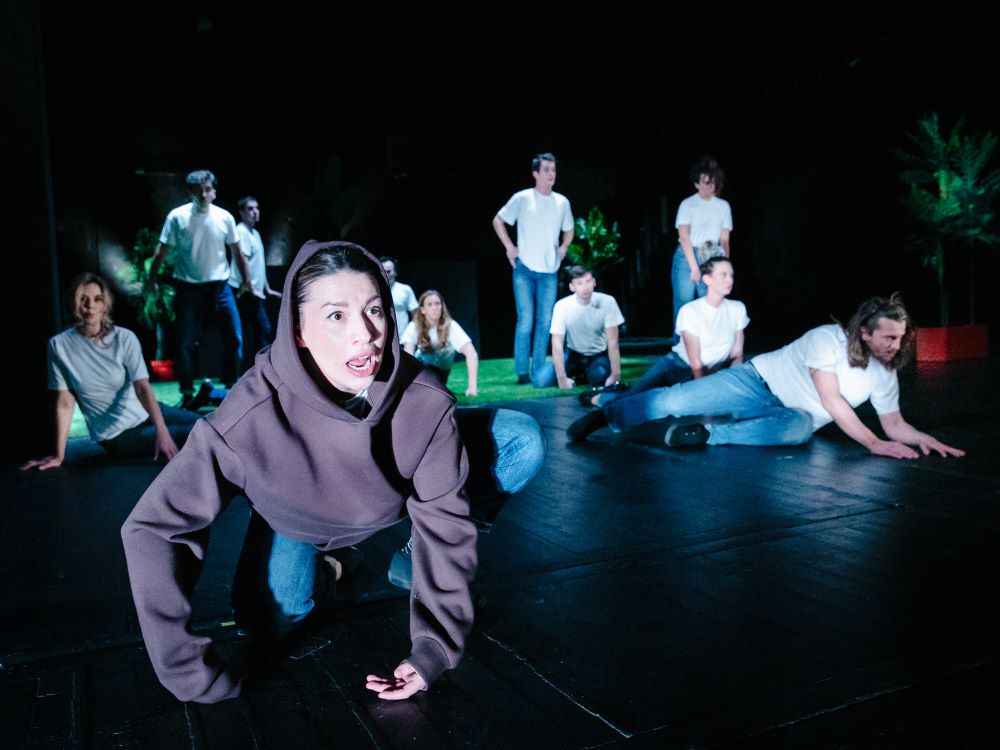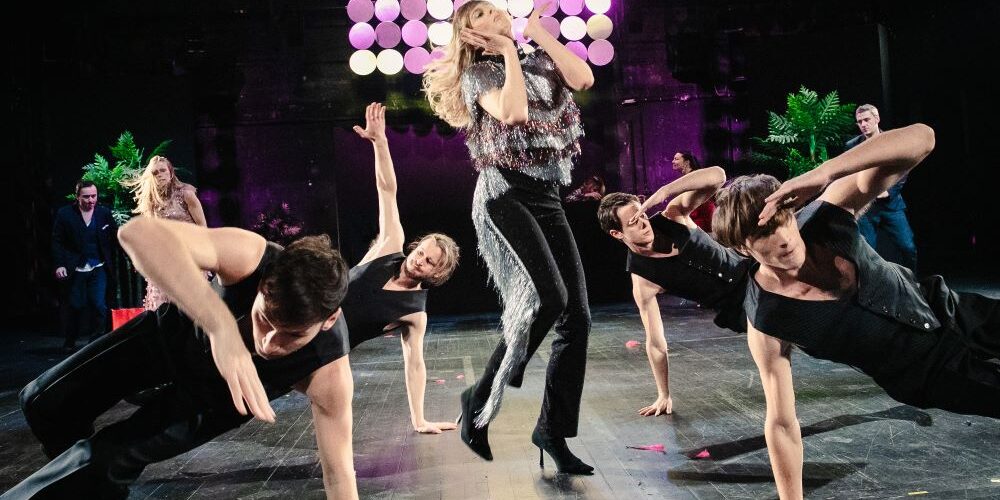Zagreb Youth Theatre, premiere 8th December 2023
Despite sharing its name, the play doesn’t really have anything else in common with HBO’s teen drama television series Euphoria, other than the fact its target audience and protagonists are teenagers. The latest ZKM production is an authorial project by Ksenija Zec, a Croatian choreographer and author of various dance and dramatic performances.
As the actors say in the play, the title refers to the general teenage spirit, the ‘teen angst’ of popular psychology and culture. I attended the preview performance where the majority of the audience were high school students with their teachers. Watching the production with them, made quite an impression on my experience of this performance, some of their reactions truly took me by surprise.
As the audience sit down, the actors come out and take a seat on one of the twelve chairs, as if they are hanging out in the school corridors during a break (one of them, Luka Knez, is eating a sandwich wrapped in a foil). All of the actors are dressed in white t-shirts and jeans for the first third of the performance in which they give an introduction about the play and the work process, each of them talking about the expectations they had from working on this project. They explain the acting technique used in the process and the animal exercises which are the most dominant aspect of the play that makes it stand out from the rest of recent ZKM’s repertoire. The actors continue to play with this meta aspect, referring to the TV show, joking about political correctness, commenting on how neither of the cast members (except maybe Knez) are part of GenZ, their target audience.
‘We are lying to you.’, says Ugo Korani before the scene changes (set design by Igor Ruf) into a simplistic wilderness, a jungle, using a couple of tall potted plants, a long rope and a grass carpet. For the next half an hour, each of the actors play their animal, slowly reducing their movement to something more human-like. There’s an ostrich, a turtle, beavers, a stork, a bear, different coloured birds, a horse, monkeys, even a giraffe which is followed by a film crew and a voice impression of what seems to be the famous David Attenborough. This segment is followed by a combination of sounds (superb music by Nikola Krgovič N/OBE) of a rainforest and wild west, as the animals are mostly demonstrating aggressive, dominant behaviour, or flirting. This part works really well as an analogy of school corridors and the institution in general as an animal kingdom with its own hierarchy between students of different years and types too.

Euphoria, Zagreb Youth Theatre. Photo: Marko Ercegović
The actors gradually become more human as they pose in front of the audience, as if the fourth wall is a mirror and their teenage characters are checking themselves out, making sure of how they look, before posing for a class photo. The piece centres around a prom night which is supposed to be their ‘final’ night of carelessness because things only get harder afterwards. Their school teacher, played by Nataša Dangubić, is a ‘cool’ teacher; she teaches Croatian language and literature at ‘one high school in Zagreb’ using modern tools, like social media, and speaks with a mix of English and slang – basically doing everything in order to be liked by her students and to get close to them. Too close, one might say, desperately trying to be their friend. She continues to present each student from her class, mostly through their social status and stereotype groups like nerd, weirdo, clown, troublemaker, and so forth. Regardless of their differences, however, there’s unity and friendship between these classmates – they hype and help each other, displaying genuine friendliness.
The most notable performance are delivered by Anđela Ramljak, Mia Melcher, Luka Knez and Ivan Pašalić. Each of the student stereotypes comes with its specific aspirations, wishes, anxieties and fears. For example, Ramljak’s character is a tall girl who gets over her insecurities by building self-confidence and doesn’t care about boys, she just wants to dance, not talk or think about future – she wants euphoria, nothing else. Melcher’s character, who experienced bullying at her old school, talks about it as if she’s filming a vlog for YouTube and, while telling her catfish story, gives in detail how the culture of texting works today, how emojis work and what leaving someone on ‘read’ means. Knez and Pašalić play ‘nerds’, the first one has an unhealthy obsession with his classmates’ grades and enrolling in STEM subjects, while the second one is a lovable class president, a goody two-shoes who doesn’t partake in any kind of vices.
Now, I start noticing the audiences’ reactions – I was prepared for the constant chatter, the need to comment everything out loud as if they are at home. However what honestly took me by surprise are the loud xeno- and homophobic reactions. I am not so deluded to not know what kind of society Croatians are but I did not expect it from high schoolers. A mass of teenagers cheering during Vedran Živolić’s monologue on ‘chocolate’ people who are ‘taking over’ jobs from the locals. Or the expressions of disgust when Korani kissed Pašalić which overshadowed Korani’s raw display of internalized homophobia. Pašalić subtly comments that he hears some kind of resentment which, considering the meta frame of the play, works fine within the piece. Considering the play is meant for teenagers, it turns out its concept was devised almost too much to the liking of its targeted audience and it fails to react accordingly to the intolerant reactions. Especially given the fact the play from the start demystifies the illusion of theatre and operates within a meta frame where there’s room for improvisation, more could have been done. The moment when one of the actors says at the beginning that he has no idea about teenagers really backfires on the performance. This further shows how young people perceive theatre content that is intended for them and how the audience treats it.
Not to end on the sour note, the play does shine a light on important topics that need to be discussed in public, among young people particularly. Feeling insecure in our body image, aspiring to unrealistic standards, to look like people we see on Instagram, instead of learning how to feel comfortable in our own skin and owning who we are. Bearing and dealing with the weight of transgenerational trauma. Leaving homeland because only abroad will young people find and realise themselves. It’s all in there.
But, it’s prom night, the seniors are there to have fun, they will clearly think about all of this some other time…
Credits:
Author of project: Ksenija Zec// Dramaturgy and text: Saša Božić (in collaboration with the actors)//Scenography: Igor Ruf//Costume: Zdravka Ivandija
For tickets and further information, visit: Zekaem.hr
Nora Čulić Matošić (1998) is a student of Comparative Literature (MA) at the Faculty of Humanities and Social Sciences in Zagreb. She has written theatre criticism for the Croatian radio programme Theatralia and web portal Kulturpunkt.hr. Besides theatre, her interests are other forms of performing arts (particularly dance performances) and film.








